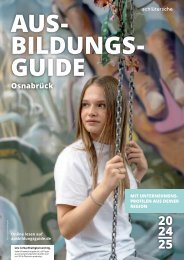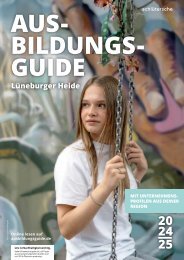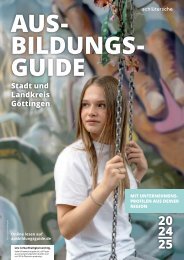Sie wollen auch ein ePaper? Erhöhen Sie die Reichweite Ihrer Titel.
YUMPU macht aus Druck-PDFs automatisch weboptimierte ePaper, die Google liebt.
ence and research has been flying high in Bremen and<br />
Bremerhaven over the last two decades. It has been an<br />
undisputed fact in the scientific community for a long<br />
time, but now at the latest on giving Bremen University<br />
the status of a University of Excellence in 2012, the general<br />
public has also become aware of the fact that the State of<br />
Bremen is one of Germany’s prime research locations.<br />
In some areas, its universities, universities of applied<br />
sciences, institutes and scientists are counted not just<br />
among the best in the country but also among the best<br />
in the world.<br />
The State of Bremen has set clear accents here. To lead the<br />
field in every sector is illusory, but not to belong to the<br />
national or international lighthouses in certain areas.<br />
Bremen puts the focus on five scientific sectors: marine<br />
sciences, material sciences, information and communication<br />
sciences, social sciences and healthcare sciences.<br />
Close cooperation between all those concerned is an important<br />
factor for success. Excellent multidisciplinary and<br />
cross-institutional cooperation among the best scientists<br />
prevails at institutions inside or outside the universities<br />
and universities of applied sciences, in Bremen or Bremerhaven,<br />
at state or private establishments.<br />
The marine sciences are probably the best example. Here<br />
it doesn’t matter whether researchers in Bremen belong to<br />
the University’s Centre for Marine Environmental Sciences<br />
(MARUM), the Max Planck Institute for Marine Microbiology<br />
(MPI), the Leibniz Centre for Tropical Marine Ecology<br />
(ZMT) or whether their counterparts in Bremerhaven belong<br />
to the Alfred Wegener Institute for Polar and Marine<br />
Research (AWI): it’s the issue that counts. Which role do the<br />
oceans play in the earth’s climate system? What is the<br />
effect of microorganisms in oceans and inland waterways?<br />
What happens in tropical coastal eco-systems?<br />
What kind of future will the reefs have? What do the Arctic<br />
and Antarctic mean for our planet? These are the kind of<br />
questions that the marine experts look into every day, with<br />
activities that generate eye-catching answers. Diving<br />
robots, research ships, polar stations: marine scientists<br />
from Bremen and Bremerhaven are on the scene wherever<br />
answers are being found to fundamental questions of our<br />
planet.<br />
Material sciences cover the full range from the single atom<br />
to a huge component. A large number of renowned institutes<br />
inside and outside the universities and universities of<br />
applied sciences are very successful in this field, thanks<br />
among others to their intensive cooperation. The large<br />
number of institutions cover practically all areas. Whether<br />
it’s a case of researching and developing one single<br />
material right down into the very last detail or creating<br />
completely new, more efficient production facilities and<br />
processes, the solution often comes from Bremen or<br />
Bremerhaven. The Institute of Materials Science (IWT), the<br />
Frauenhofer Institute for Manufacturing Technology and<br />
Advanced Materials (IFAM Bremen) and the Frauenhofer<br />
Institute for Wind Energy and Energy System Technology<br />
(IWES Bremerhaven), the Bremen Institute for Applied<br />
Beam Technology (BIAS) or the Bremen Fibre Institute<br />
(FIBRE) are just a few examples for many of Bremen’s institutions<br />
in this field. The solutions they produce are important<br />
for the many branches of industry with which they<br />
cultivate close relations: aviation and aerospace, wind<br />
energy and environmental technology, the automotive<br />
branch, shipping and many others benefit both from the<br />
pure research and also from highly specific applicationbased<br />
projects.<br />
Activities naturally also repeatedly overlap with other<br />
areas. Who knows that there’s a lunar surface in Bremen?<br />
The Space Exploration Hall of the German Research Centre<br />
for Artificial Intelligence (DFKI) is the setting for the development<br />
and testing of mobile robot systems that will perform<br />
complex tasks on land, on water, in the air or in outer<br />
space for complex tasks, with a natural proximity to the<br />
material sciences or communication and information<br />
technologies. Another section of the DFKI also develops<br />
systems to assist in everyday situations, such as electric<br />
wheelchairs and Rollator walkers, so that the DFKI is also<br />
involved in Bremen’s focal area of healthcare sciences. This<br />
Continued on page 165<br />
161


















